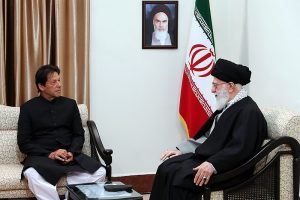Iran and Saudi Arabia, which have been major rivals in the Middle East, recently announced they intend to restore diplomatic ties and reopen their respective embassies. This historic breakthrough was achieved after talks in Beijing that were brokered by China. As part of the agreement, both countries have agreed to resume diplomatic relations within two months. Diplomatic ties between Iran and Saudi Arabia were severed in 2016 after the Saudi execution of Shia cleric Nimr Al-Nimr, which sparked anger and protests in Iran. This recent development is seen as a positive step toward resolving long-standing tensions and conflicts in the Middle East.
The normalization of ties between Iran and Saudi Arabia presents implications and opportunities for Pakistan, as Iran’s neighbor, Saudi Arabia’s partner, and China’s key ally. The animosity between Tehran and Riyadh has had serious implications for Pakistan, which claimed neutrality but in practice titled toward Saudi Arabia, mainly due to economic dependence and religious affiliation. However, Pakistan has made efforts to bring the two states to the table, with then-Prime Minister Nawaz Sharif of Pakistan calling mediation between the two countries a “sacred mission” in 2016.
In 2019, Pakistan’s then-Prime Minister Imran Khan visited Iran and Saudi Arabia and displayed the intent of acting as a mediator. In May 2021, Pakistan’s foreign minister visited Iraq, which was playing an active role in seeking rapprochement between Saudi Arabia and Iran, to contribute to the process. Although no significant breakthrough was made at the time, this rapprochement positively impacted Saudi-Iran reconciliation.
With diplomatic ties being restored, Pakistan can now maintain balanced diplomatic ties with both states, which is a much-cherished moment.
The restoration of diplomatic ties between Iran and Saudi Arabia is a significant development for Pakistan, which has welcomed the agreement as a positive step toward regional peace and stability. Pakistan has a vested interest in maintaining friendly relations with both Iran and Saudi Arabia. In the past, these relationships have been impacted by cross-border crime and terrorism, and a balanced approach toward both countries is crucial for addressing such issues.
Moreover, the normalization of ties between Iran and Saudi Arabia presents massive opportunities for trade and energy ties. Pakistan can benefit from increased economic cooperation with both states. Neighboring Iran has always been an important trading partner of Pakistan, and Saudi Arabia is a significant economic ally, with a large Pakistani diaspora working in the Kingdom, which is a significant source of remittances.
Pakistan has been plagued by sectarian violence for decades, with Sunni-Shia tensions being exploited by extremist groups to fuel conflict and create instability. This situation has been exacerbated by the regional rivalry between Saudi Arabia and Iran, as both countries have sought to exert influence in Pakistan and use sectarianism as a tool to further their geopolitical interests. Therefore, the normalization of ties between Iran and Saudi Arabia could have a positive impact on Pakistan, as it may help to defuse sectarian tensions and reduce the influence of extremist groups. Improved relations between these two regional powers could also lead to a more stable and peaceful Middle East, which would be beneficial for Pakistan as well as the broader international community.
Moreover, Pakistan has a significant Shia population, which has historically faced discrimination and marginalization. Improved ties between Iran and Saudi Arabia could help to alleviate the suffering of this community and promote greater religious tolerance and coexistence in Pakistan. The normalization of ties between Iran and Saudi Arabia has the potential to bring about positive change in Pakistan by reducing sectarian tensions and promoting religious tolerance.
Moreover, it would provide Pakistan with an opportunity to pursue a neutral foreign policy, which could help to strengthen diplomatic and economic ties with both countries. Pakistan’s friendly relations with Saudi Arabia could result in economic and political support, particularly on issues such as Kashmir. Additionally, strengthening ties with the GCC could offer Pakistan new opportunities for economic cooperation. Meanwhile, closer ties with Iran would be essential for improving regional security; while close ties between China, Iran, and Pakistan would be crucial for the success of the China-Pakistan Economic Corridor and the larger Belt and Road Initiative (BRI).
Pakistan has a history of playing a constructive role in the Middle East and has consistently supported and coordinated efforts to bridge gaps between countries in the region. In light of the recent restoration of diplomatic ties between Iran and Saudi Arabia, it is important for Pakistan to continue this role and help maintain the positive momentum and contribute to a more stable and peaceful Middle East, while also strengthening its own position as a regional player. This will require a nuanced approach that takes into account the interests and concerns of all parties involved, but the potential benefits for Pakistan and the wider region are significant.

































